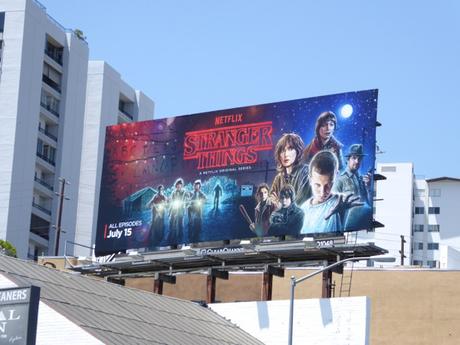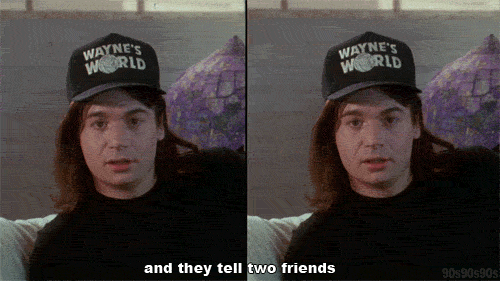I have now watched the first 4 episodes of Stranger Things: Season 2, but before I write about them I need to get this nagging question out of my head. It's a question I don't have a full answer for yet, but it's one I've pondered a lot lately: Why is Stranger Things so popular?
I binged Stranger Things within a week of its debut and loved it. Sure, the snow's nostalgic elements which had initially seemed so appealing eventually became intrusive but, eh, I still had fun seeing how this little slice of Spielberg-meets-King played out. Within a month, Stranger Things quickly faded from memory, often battling for space in my mind with the memories I already had of the various iconic 80s films the Duffer Brothers pulled from. However, even if the exact details of Eleven's backstory or what the demogorgon looks like failed to stick with me I still remembered that upon first viewing Stranger Things was something I couldn't stop watching.
Then the Stranger Things phenomenon happened. Eleven fan art was everywhere. The internet became obsessed with Barb, the poor, innocent best friend killed off simply so the Duffers could establish stakes. The Stranger Things font, patterned not just off old Stephen King book covers but also Richard Greenberg's work on Alien and The Untouchables, was suddenly an inescapable internet meme. Stores and online retailers were flooded with so much cheap, unofficial show merchandise Netflix was forced to create its own official licensing division, making them the first streaming service to do so. They had to. According to some unofficial measures, Stranger Things is their most-watched show.
More than anything, though, the world seemed to fall head over heels in love with those kids - Millie Bobby Brown, Finn Wolfhard, Gaten Matarazzo and Caleb McLaughlin. They were on every talk show you could imagine and a constant presence at awards shows where the camera's obsessive knack for finding them in the crowd for reaction shots bordered on unseemly. They were sometimes treated like little props scientifically engineered to elicit "awwwww"s and social media mentions. They memorably handed out PB&J sandwiches at the Emmys, and celebrated like, well, kids when they won at SAG.
Before long, the kids all got piped into the fan convention gold rush, made a small fortune and then angled for a raise from Netflix, which has them all signed to a 6-year deals. I personally observed the long lines to see Millie Bobby Brown and her castmates at Denver Comic Con this summer. Those same fans probably all rushed into movie theaters to see Wolfhard in It two months ago, the irony of Wolfhard going from a Stephen King-inspired series to an actual Stephen King movie likely lost on them.
But with extreme fame comes inevitable pushback, pushback against the pushback and "what does this all mean?" navel-gazing. So, to the naysayers Stranger Things is but an overrated cover band, blasting out the old hits for audiences who might just be too stupid, too young or too desperate for escape to care. To the show's defenders, the cover band analogy is unfair because it doesn't properly credit the Duffer Brothers for the clever ways in which they twist their nostalgia just enough and combine so many different elements together to create something new, if familiar. To the intellectuals, the show's popularity is part of a larger trend of empty-headed nostalgia, the kind we tend to indulge in during times of trouble or existential malaise, which is why so many shows set in the 50s were so popular in the economically depressed, politically tumultuous 70s.
The latter comes f rom Vox, which argues our recent wave of nostalgia-fueled entertainment perfectly aligns with the shifting national mood throughout the Obama administration. At first, we were overjoyed and filled with optimism, giving rise to uplifting Best Picture winners and superheroes galore. Then as "Obama the hero" morphed into "Obama the mere mortal handcuffed by ineffectiveness and a combative Congress" our stories took on a more reflective, depressing tone, which either forces audiences to face stark truths about the world or long for escape into the past (kind of like Stranger Things) or just escape from reality altogether via fantasy adventure stories and horror narratives which provide a cathartic scare (hey, also kind of like Stranger Things):
Take two of 2016's biggest sensations: the Netflix original series Stranger Things and the aforementioned La La Land. I greatly enjoyed the experience of watching both, then found that they evaporated from my mind almost immediately afterward.
This is not to say either is unworthy - indeed, both works do exactly what they set out to do - but they too often confuse the naked celebration of past entertainment forms with offering cultural commentary. They're stories about what it feels like to watch other stories [added: makes sense since Stranger Things: Season 1 is set before the Duffer Brothers were even born, and is inspired by their childhood memories of watching old VHS tapes of 80s movies]. That's a tremendously hard thing to pull off without feeling derivative, but even when it's done well, it can leave you feeling like you just ate a bunch of empty calories.
Is that all there is to Stranger Things ' popularity? Is that explanation even applicable to the show's worldwide fans? What about the younger fans who are obviously not blinded by nostalgia? Are they, too, somehow intuitively reading the room, so to speak, and responding to the national hunger for escape? Aren't they also just the most interactive-leaning generation in pop culture history, and here they are handed a show featuring kid protagonists and a style which lends itself perfectly to fan art, YouTube videos, Snapchat and whatever else?

Let's say Vox is right, though. That this is all simply a byproduct of the cultural whims of the day as dictated by our increasingly chaotic political and economic landscape. Why Stranger Things, then? Why not any of the other nostalgia pieces or 80s-set TV show out there? Why did Stranger Things break out in ways few, if any others have in the last year and a half? Sure, it's incredibly well-made, but so is just about everything on TV these days (or so it seems). How, in mimicking the likes of E.T. and Stephen King's best, did Stranger Things also manage to mimic their massive success?
The answer is largely tied to the one old-fashioned trick Stranger Things pulled off without actually meaning to: it captured lightning in a bottle.

There was no massive marketing campaign, just some billboards in L.A., really. Its release date wasn't event-ivized. It was simply released into the wilderness, and everyone involved was left to cross their fingers. As the Duffer Brothers told Wired, "Netflix isn't spending movie-level marketing money-they want people to find this stuff through word of mouth. Mr. Robot season two was premiering like a week before us, and I was just like, 'How are we going to get any press?'"
That's rare. Outside of Netflix, hardly anyone in Hollywood does this anymore. It's simply not compatible with the blockbuster filmmaking model. However, it's exactly how hit movies used to happen. They came out here and there. Word of mouth spread. Over time, they added more and more theaters and played to increasingly sold out crowds, and that organic growth actually added to the experience. With that a distant thing of the past, increasingly media-savvy audiences have grown suspicious and untrusting of the current Hollywood hype machine.
Then suddenly there's this little show on Netflix (which, it should be noted, has nearly 100 million subscribers worldwide). It looks just as good as any big budget movie. Winona Ryder's in it (and who doesn't love a comeback story?). The opening credits have the coolest theme song ever. The plot, tone, production design, writing...everything feels familiar, but also kind of fresh. Every episode seems to have a cliffhanger, tailormade for binge culture. There's a mystery box element to the narrative which keeps you hooked (and will later lead to all sorts of theories and predictions articles you'll read). You've never heard of the show creators before, but their name - the Duffers - sounds kind of cool and mysterious. Beyond Ryder and I've-seen-him-before-but-I-can't-remember-where David Harbour, the cast is entirely comprised of unknowns who all seem so genuine and natural. Plus, there's a young female hero? Finally! That's awesome.
More importantly, it feels like something you discovered, not something you were force fed. Because you watched it. And then you told a friend about it. And then...

And those friends went along that word-of-mouth chain because Stranger Things is so well-executed and so chock full classic movie-derived elements that it was bound to succeed.
"Yeah, but why this popular?" I used to wonder. I eventually fell into the "sure, it's good, but it's not that good" camp, which might just have been me reacting to the show's success and not the show itself.
However, as I binged the first episodes of the second season last night I was reminded of something I'd forgotten: this show is just so much fun to watch. The kids are so natural together, the plot so deliciously half-Spielberg, half-King/Cronenberg/Carpenter. I can't wait to get back to it, and this point I'm done with overthinking its popularity.
What about you? What do you think? Where do you stand on Stranger Things, season 1 and/or 2? Let me know in the comments. Please, though, no season 2 spoilers. I'm not even halfway through yet.

